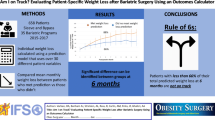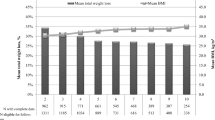Abstract
Background
The American Society for Metabolic and Bariatric Surgery has released a Bariatric Surgical Risk/Benefit Calculator, an online tool with which patients and providers can input patient preoperative information and predict their 1-year weight loss. We seek to validate our institutional data with the national database and investigated patient factors that influence lack of treatment effect after bariatric surgery.
Materials and methods
A retrospective review of all prospectively collected data of bariatric surgeries performed at Yale New Haven Hospital from 2017 to 2018 was conducted. By entering data into the MBSAQIP Calculator, the 1-year predicted Body Mass Index was calculated and compared to the actual weight loss. Statistical analysis was performed using an unpaired t-test with Welch’s correction (Prism 8, GraphPad).
Results
The average difference between the actual and predicted weight loss at 1-year for 327 patients was 3.6 BMI points. When the actual weight loss was compared to predicted BMI at 1 year, a high correlation was found (R = 0.6, P = 0.003). We examined the outliers with a comparison of weight loss for those patients who’s BMI fell within 5 points of the predicted versus those whose BMI recorded above 5. It was discovered those patients who had higher than 5 BMI points than predicted, had higher preoperative BMI (46.1 vs 43.6, P = 0.008).
Conclusions
The MBSAQIP calculator is a useful tool to guide surgeons with decision-making and informed consent. Our institution’s 1-year weight loss data correlated closely with that predicted. From the outliers, we found that patients who did not meet the predicted weight loss had significantly higher preoperative BMI. This may alter preoperative discussions with class 3 or over obese patients regarding expected weight loss and warrant investigations with the national database to develop modifications of the calculator.



Similar content being viewed by others
References
Nguyen NT, Root J, Zainabadi K, Sabio A, Chalifoux S, Stevens CM et al (2005) Accelerated growth of bariatric surgery with the introduction of minimally invasive surgery. Arch Surg 140(12):1198–1202. https://doi.org/10.1001/archsurg.140.12.1198discussion 203
Telem DA, Dimick JB (2018) Practical guide to surgical data sets: Metabolic and Bariatric Surgery Accreditation and Quality Program (MBSAQIP). JAMA Surg 153(8):766–767. https://doi.org/10.1001/jamasurg.2018.0495
Organization WH (2000) Obesity: preventing and managing the global epidemic. World Health Organization, Geneva
Noyes K, Myneni AA, Schwaitzberg SD, Hoffman AB (2020) Quality of MBSAQIP data: bad luck, or lack of QA plan? Surg Endosc 34(2):973–980. https://doi.org/10.1007/s00464-019-06884-x
Balla A, Batista Rodríguez G, Corradetti S, Balagué C, Fernández-Ananín S, Targarona EM (2017) Outcomes after bariatric surgery according to large databases: a systematic review. Langenbecks Arch Surg 402(6):885–899. https://doi.org/10.1007/s00423-017-1613-6
Hall BL, Hamilton BH, Richards K, Bilimoria KY, Cohen ME, Ko CY (2009) Does surgical quality improve in the American College of Surgeons National Surgical Quality Improvement Program: an evaluation of all participating hospitals. Ann Surg 250(3):363–376. https://doi.org/10.1097/SLA.0b013e3181b4148f
Mehaffey JH, LaPar DJ, Turrentine FE, Miller MS, Hallowell PT, Schirmer BD (2015) Outcomes of laparoscopic Roux-en-Y gastric bypass in super-super-obese patients. Surg Obes Relat Dis 11(4):814–819. https://doi.org/10.1016/j.soard.2014.11.027
Nickel F, de la Garza JR, Werthmann FS, Benner L, Tapking C, Karadza E et al (2019) Predictors of risk and success of obesity surgery. Obes Facts 12(4):427–439. https://doi.org/10.1159/000496939
Jackson WL, Lewis SR, Bagby JP, Hilton LR, Milad M, Bledsoe SE (2020) Laparoscopic sleeve gastrectomy versus laparoscopic Roux-en-Y gastric bypass in the pediatric population: a MBSAQIP analysis. Surg Obes Relat Dis 16(2):254–260. https://doi.org/10.1016/j.soard.2019.11.009
Ece I, Yilmaz H, Alptekin H, Yormaz S, Colak B, Yilmaz F et al (2018) Comparative effectiveness of laparoscopic sleeve gastrectomy on morbidly obese, super-obese, and super-super obese patients for the treatment of morbid obesity. Obes Surg 28(6):1484–1491. https://doi.org/10.1007/s11695-017-3053-3
Jain D, Sill A, Averbach A (2018) Do patients with higher baseline BMI have improved weight loss with Roux-en-Y gastric bypass versus sleeve gastrectomy? Surg Obes Relat Dis 14(9):1304–1309. https://doi.org/10.1016/j.soard.2018.05.014
Sepúlveda M, Alamo M, Saba J, Astorga C, Lynch R, Guzmán H (2017) Long-term weight loss in laparoscopic sleeve gastrectomy. Surg Obes Relat Dis 13(10):1676–1681. https://doi.org/10.1016/j.soard.2017.07.017
Author information
Authors and Affiliations
Corresponding author
Ethics declarations
Disclosures
Randal Zhou, Lee Ying, Jessica Valle, Jessie Moore, Geoffrey Nadzam, Kurt Roberts, Saber Ghiassi, John Morton, Andrew Duffy have no conflicts of interest or financial ties to disclose.
Additional information
Publisher's Note
Springer Nature remains neutral with regard to jurisdictional claims in published maps and institutional affiliations.
Rights and permissions
About this article
Cite this article
Zhou, R., Ying, L., Valle, J. et al. Correlating actual one-year weight loss with predicted weight loss by the MBSAQIP: bariatric surgical risk/benefit calculator. Surg Endosc 35, 5705–5708 (2021). https://doi.org/10.1007/s00464-020-08030-4
Received:
Accepted:
Published:
Issue Date:
DOI: https://doi.org/10.1007/s00464-020-08030-4




